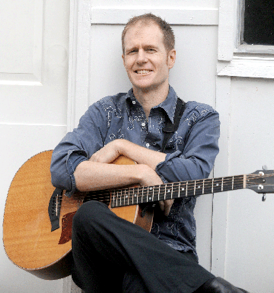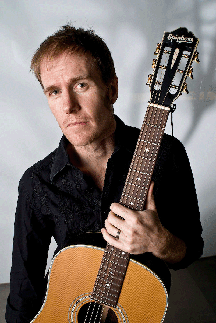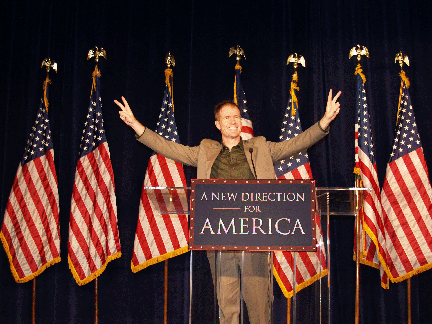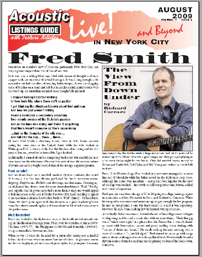Fred Smith
The View From Down Under
by Richard Cuccaro

Sometimes an outsider’s view of America, particularly New York City, can carry a greater impact than that of one of our own.
So it was, that a talking blues rap, filled with stream of thought and stark imagery took me on a tour of several boroughs. It wasn’t long enough to be exhaustive but had the effect of seeming kaleidoscopic. Above the chugging rustle of brushes on a snare and soft but muscular electric guitar chords with the reverb up, an Australian-accented voice thoughtfully intoned:
I stopped talking I started walking
In New York City where there ain’t no parkin’
I got thinking like Abraham Lincoln about God and man
And how we just weren’t linking
Heard a band play a completely smashing
Two-minute version of the St John’s passion
And as the tune was rising and found it surprising
That there wasn’t someone up there supervising
…And as the thoughts of the city rise…
And fall into the bay… there… there…
I’d heard Fred Smith, a charming Aussie, twice at NYC house concerts
during his three years in the United States while his wife worked in Washington D.C. It took a while, but the flat Australian twang and his wry sense of humor, proved to be irresistible. I got hooked.
Additionally, I learned about his compelling back story. His sensibilities have been honed on the whetstone of history. His view of even the most mundane of events can carry a weight beyond that of the average singer/songwriter.
Fred or Iain?
Fred Smith was born Iain Campbell Smith in 1970 in Canberra, the capital of Australia. His first two albums, published for North American release, Bagarap Empires and Ballads and Barsongs, use that name. Growing up, his nickname had always been the more Australian-friendly “Fred.” He figured, rightly, that his given name had a more literary ring, and would appeal to folk audiences, so he used it for the first two CDs. Later, needing to appeal to an Australian audience, he switched back to “Fred” (Smith), for his album, Texas. We don’t quite agree with this decision as a great marketing/career move, but, there’s something fast and loose about his life which makes it seem like perfect sense.
Well Rounded
Fred’s dad worked in the diplomatic corp, so the family moved around during his childhood and teenage years. They lived, for stretches, in India (1970-73), Israel (1975-77), the Philippines (1980-84) and Honolulu (1988-89), living in Australia in between and later.
When he was 10 years old, he asked for a guitar after having seen a fanciful Robin Hood cartoon where an arrow flew out of a lute. He got some lessons and learned to play in jazz and classical guitar styles. As a youngster, like many musicians-to-be, the Beatles made a huge impact on Fred. At 17 years old he teamed up with a friend who was a good singer, and they got a job playing in a bar every Friday night for two hours. They did assorted covers, mostly by Simon and Garfunkel, Bob Dylan and Neil Young and walked out with $40 to share.
From 18 to 19 years of age, Fred worked as a crew mess manager for a cruise line out of Honolulu while his father served in the diplomatic corp there. Although his duties were mundane -- seeing that food supplies for the crew of the ship were stocked -- his travels to different ports around Hawaii added to his store of experience.
Fred spent six years from the age of 20 to 26 going to college, earning degrees in economics and law. He started in Perth and finished in Canberra. While he was good at economics and smart enough to get through the law program, he says he just ground it out. His heart wasn't in it and it was depressing. However, he says, from studying law, he learned writing structure..
What finally clicked was music. Towards the end of his college career he began writing songs and formed a comic duo with an actor friend. Their first gig was a "variety show night" at a place called the Terrace Bar. It was a bohemian scene with beer-stained carpets and poets reading works dealing with "themes of desire and failure,”. He recalls waking the next morning with a sense of vocation -- “it just felt right.” Fred started to come up with songs mostly about drinking and some with a political bent. He eventually found a rhythm section, formed a band and started playing the bars of his home town, Canberra.

The Foreign Service
On a more practical side, he found that he had an affinity for foreign affairs and applied for and got a job with the Australian Foreign Affairs Department. He still played with the band on weekends. At the end of 1998, he completed his first CD, Soapbox.
In 1999, as a member of the Foreign Affairs Department, he then took his place in history. The story begins in WWII. Early on, the Japanese captured and occupied the Solomon Islands, just to the east of Australia.
Epic battles on highly valued strategic ground were fought between the American and Australian allies and the Japanese. Some of the bloodiest battles took place in Bougainville, at the northernmost tip of the Solomons. Allied victories resulted in their occupying Guadalcanal Island, south of Bougainville, and capturing Henderson airfield near its capital, Honiara
After the allies took control, men from the island of Malaita, next to Guadalcanal, were recruited as a civilian workforce on the main base at Henderson airfield. After the war, they stayed on, becoming the dominant ethnic group. In the late 90’s strife broke out between the native Guadalcanal people and the Malatians. Civil war created chaos throughout the Solomons. Although Australia had relinquished governmental interest in the Solomons, they figured prominently in bringing about a peaceful solution.
Fred was one of a 50-man unarmed International Peace Monitoring Team sent in by Australia to broker a truce. They were no match for the armed factions. Chaos reigned until Australia sent in an armed force. He later served as a civilian advisor to the Peace Monitoring Group in Bougainville, now part of Papua New Guinea. During his time in Bougainville and the Solomons, he got to know the population and some of their stories.
It went like this:
In 1999, as part of the peace process, Fred was sent to southwest Bougainville, the first time for 7 months and a second time for 3 months. Initially, as the one foreign affairs member with a group of 7 unarmed soldiers, they set up camp at a burned-out store in a village in the southwest of the island. They were assigned a three-man native security team- ex combatants Ben, Joe and Dominic who loved to play guitar. and taught Fred to speak pidgin language and sing songs in the local dialect. His songwriting took a thoughtful turn and he began writing songs about the peace process.There was something of a cultural gulf between Fred and the soldiers. While they might entertain themselves watching a Tom Cruise action film, Fred would grab his guitar and go off and write songs.
During the day, on rounds through the villages, he'd break out his guitar and begin singing in Pidgin, as a way to break the ice. The military command recognized Fred's ability to reach the people through music and build confidence in the peace process and trust for the peace makers. The patrols were structured abound the music, so it became standard procedure for Fred to travel with a peacekeeping group and sing at each stop. By the end of his tour the Australian army sponsored Fred to work with local musicians to record a cassette of Songs of Peace, 20,000 copies of which were distributed around the island.
He says, “It made a difference,” just being there, getting out in the villages every day. The truce eventually took hold, and in one of history's most amazing turnarounds, people put ethnic animosities behind them and honored a peace agreement.
Bagarap Empires
Fred’s first wide-release CD Bagarap Empires tells some of what he learned. Bagarap is pronounced “Bugger-up,” which is New Guinea Pidgin English, a native dialect, for “F*cked-up,” or as Fred puts it, more chastely, in the liner notes, “When things go wrong.” As in any war — the obscenity of all obscenities — many things go wrong. That means Fred has many things to tell.
The album begins with the song “Blue Guitar,” an ode to the instrument that more than carried its weight, shouldering enormous psychic burdens:
These small Pacific towns all start to look the same Missionaries and mercenaries play their little games
“Better bash ‘em with the Bible than the butt of an SLR,” or so they say but either way I’d rather play my blue guitar
“Say a Prayer” looks backward to 1942 to the Battle of Savo Island in which the Australian ship Canberra was ambushed and sunk by the Japanese, along with American ships. It imagines the death of a newly-wed Ausssie seaman:
A rainy night and the wind blew somber
Anchored north of the Manitomba
Round the point of Savo Island
The Furitaka with her 8 inch guns ablaze
Not a prayer for the Cruiser Canberra
“When She Cries” could not have been written without Fred’s relationship with the native islanders. The story is from the perspective of a Bougainville Revoutionary Army fighter who laments his wife’s suffering at the hands of the Papua New Guinea government forces:
My house I can rebuild when it’s time to start a new life
But what they did to my wife, cause it seems to me now that
When she cries oceans
She finds ways to hide
When she bleeds roses
She bleeds all inside
Fred also hosted a radio show, “Saturday Night Party” (“Saredi Nait Pati”) where they’d do interviews, play requests, talk about the peace process and discuss gardening. Each show would end with a song, “Radio Bougainville” (included on the CD) that Fred describes as being “cheesy, even by island standards,” :
Radio Bougainville, on Buka Island, singing to Bougainville, keeping you smiling!
There are many other songs presented with visceral clarity, telling the stories of the islanders and of Fred’s time there, up to his farewell.
The CD insert is filled with photographs from Fred’s days in Bougainville. There are some of him with the the islander children and others of the islander soldiers.
Coming to America

In mid-2004, he married his long-time girlfriend Maryanne, who worked with the Australian embassy. In November 2004, she was transferred to the United States, to Washington, D.C. Fred, of course, came with her. When Fred got to the United States a new adventure began. Through fellow Aussie folksinger Penelope Swales, he learned about the Northeast Folk Alliance Conference (Penelope had been a formal showcase performer in 2003). Fred performed an unoffficial showcase with concert organizers Vic & Reba Heyman, and made some connections. He met Brooklyn singer/songwriter Pat Wictor and fan/organizer Gordon Nash, who runs the “Budgiedome,” a late-night performance tent every year at Falcon Ridge Folk Festival. Gordon also helped Fred find gigs. In the summer of 2007, he attended Falcon Ridge and performed at the Budgiedome.
While Fred and Maryanne made a home in Washington, through a friend at the U.N., he found a place to stay in New York City and worked on getting gigs locally.
He then attended the National Folk Alliance and was awarded an official showcase performance.
The Professor
Ever enterprising, Fred sent an e-mail advertising a lecture he devised on the Bougainville Peace Process, the world’s first unarmed peacekeeping operation, to about 20 different
colleges. He wound up doing the lectures in a number of Colleges from Portland, Oregon to Wilmington, Ohio to Georgetown and the University of Idaho at Moscow. He was able to build a tour around the lectures.
Touring the Heartland
Fred counts among his more important experiences, the various shows he played with Pat Wictor, James Keeglahan in Portland, Oregon and with Joe Jencks. On tours with Joe, they went “from Colorado, through Kansas and Missouri, up into Illinois then through northern NY State to Ottawa.” He stated, “Because touring is not particularly lucrative one can’t budget for hotels so one stays with people and that, for me, was such a precious opportunity to get to know something close to the real America, rather than the one I had seen on TV as a kid.”
When I asked Pat Wictor for his experiences with Fred/Iain (which he used while in the U.S.), he responded:
“I was introduced to Iain by fellow Aussie Penelope Swales, who had raved about his songwriting to me. We all went down to Coney Island for a stroll on the beach, and Iain and I took turns in a batting cage. I chose the 47mph softballs, and Iain went for the 80+ mph hardball pitches. As I came to see, it was typical fearless Iain--he wasn't bothered by missing the first few, and then started whacking ‘em.
We got to be great friends over the years, doing shows together in Maryland, on Long Island, and in NYC. We collaborated pretty well, me backing him up on slide guitar, him putting guitar and harmonies behind some of my tunes. He's a favorite of mine as a songwriter: outstanding sense of melody, and the narrative voice in his songs is always engaging and distinctive. Bagarap Empires gets a lot of play on my iPod.
We were in constant conversation for the time he was here, much less so now. I miss him a great deal--his can-do intrepidness, his unflappability, and his wit, and of course those great songs.”
Ballads and Barsongs
Fred’s tours around the country fed into a mind acutely attuned to register every blip in human nature and filter it through a wit not unlike an Australian Mark Twain.
In late 2006, Ballads and Barsongs was released in the U.S., no mean feat for a non-citizen here for a limited stay. A friend, Mark Sylvester, in Tacoma Park, Maryland helped get the CD made.
Fred’s humor is on full display in Ballads. In “Seven Ways, he describes the brief period before he kick-started his U.S. music career, his staying at home while Maryanne worked and the
tensions it caused:
Saturday nights and Sunday morning
These are the times when my baby needs warmin’
The rest of the week, she’s a woman on a mission
She’s got a job, but I’m a musician, and it’s…No holiday…
Find 7 ways to pass the time of day
Friday night and she’s feeling weary
I say I’d like to borrow 20 bucks, dearie
I’d like to go out drinking with Larry
She says, “That’s fine, but I’m ending this marriage”
I say, “Love will find a way…”
Seven ways to pass the time of day
Fred started making the CD, Texas here in the U.S. in August and September of 2007. When Maryanne’s job tour in D.C. ended in the fall of ‘07, they both returned to Australia, where the CD was finished. His experiences in the U.S. were rich with material. Upon hearing the title track of Texas, we assume that his wife’s raised eyebrow matched his own:
In a hotel room in Dallas
I could not believe my eyes
Lord she had a map of Texas tattooed
in between her thighs
With El Paso and Texarkana
on each corner of the map
When I got to Corpus Christi,
well there was no turning back
Up to the Present
Fred still works part-time for the Australian Foreign Service and is still writing and singing. His new album, soon to be released is called Urban Sea Shanties -- a collection of comic drinking songs performed in collaboration with an Australian Gregorian mens's choir called the Spooky Men's Chorale. The CD was released in Australia in April and won the National Folk Recording Award.
He plans a tour of the United States in the coming year. Watch for a tour notice in Acoustic Live in NYC.

